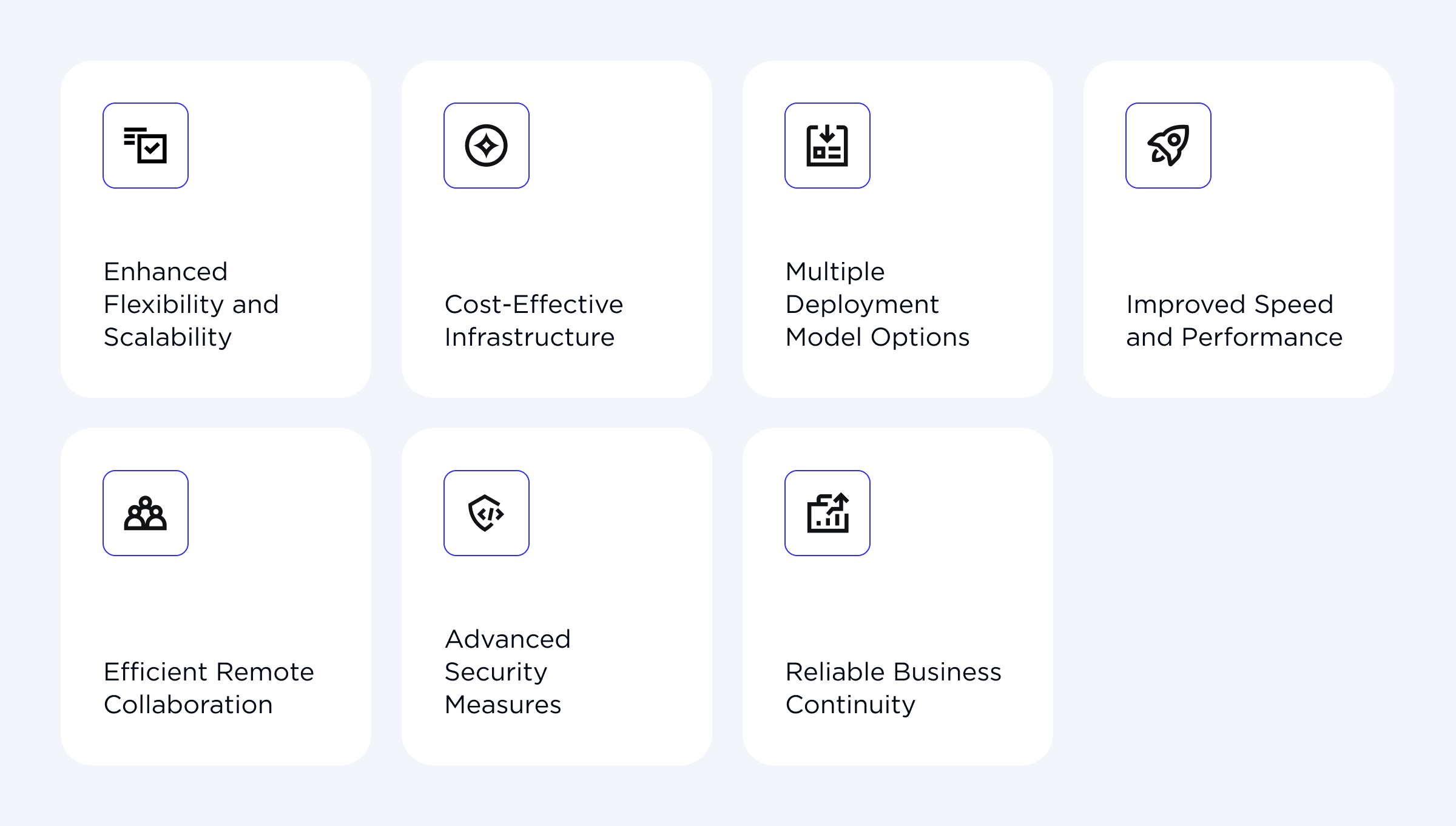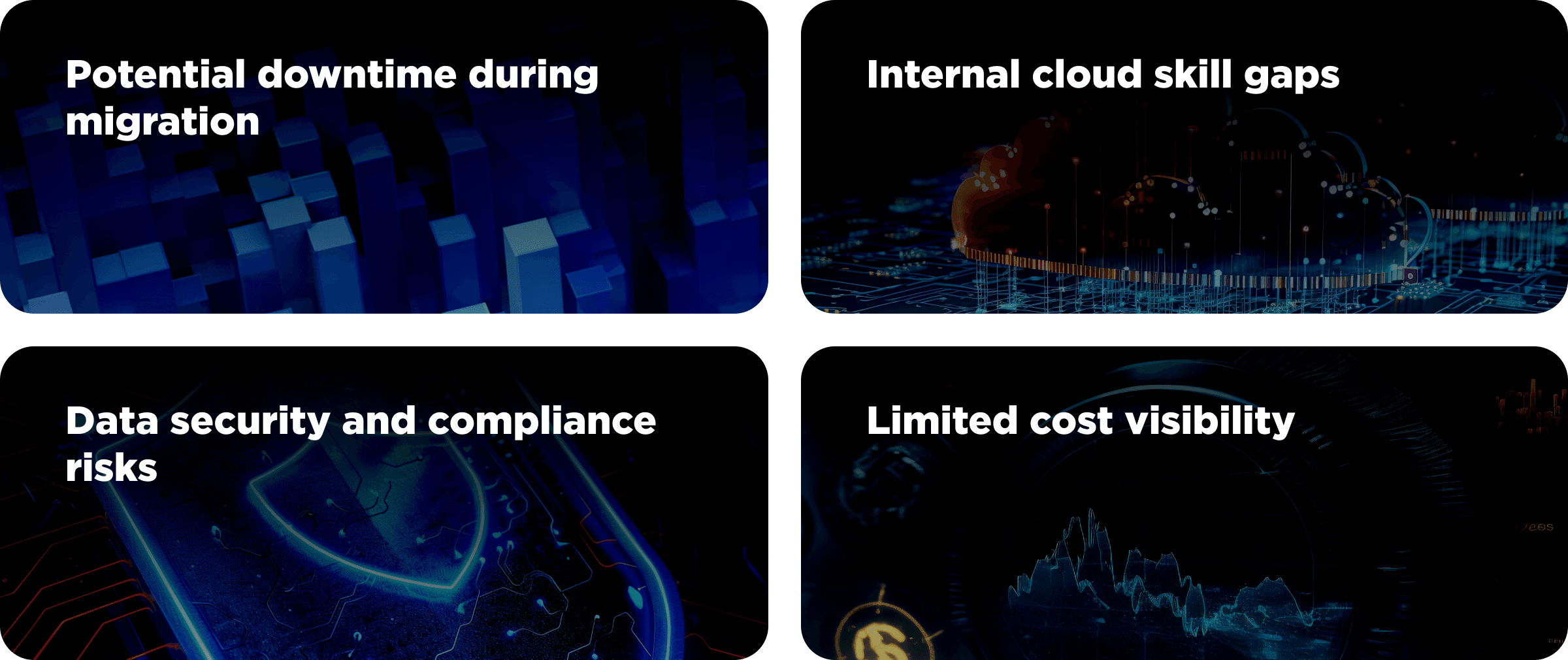What are the main aspects startups need to pay attention to? Considering the recent developments in the fast-evolving world, advanced technology takes the first place. It’s basically a lifeline for a successful venture. When it comes to cloud computing, that’s the foundation.
Building a fintech platform? Launching an AI-driven solution? Starting an online store? No matter what your startup plans are, cloud technology gives you an upper hand. Let’s break down why cloud computing is a strategic advantage in 2025.
Defining Cloud Computing
Before we dive into the advantages of cloud computing for startups, let us explain in simple words what it means. Cloud computing is a powerful tech that lets you access computing power, storage, databases, and tools over the internet. It eliminates the need to manage them on physical hardware and even own a single piece of it. The best way to compare it to something else would be to define it as an online subscription. In a nutshell, you only pay for what you use. However, you can scale up or down anytime you want.
When it comes down to startups, there’s no denying what a game-changer cloud solution is. You can forget about breaking the bank in order to have a bulky infrastructure. With cloud computing for startups, you can focus on building, testing, and growing your product from day one. No need to delay, let’s discover more about the actual pros of such a solution.
Cloud Computing: What Are the Benefits for Startups?
Some startup owners might have already realized how great and groundbreaking the cloud platform is without us uncovering more about it. But others may still ask, “How can cloud computing help startups?” And that’s a very sound and reasonable question which we are going to explore in simple terms, looking at how it solves real startup challenges, fuels growth, and makes modern business possible right from the beginning. So, buckle up and let’s explore cloud computing benefits.

Allowing for better flexibility and scalability
Hopefully, you are well aware of the fact that startups don’t stay small for long. Actually, that’s the whole point, right? That’s why cloud computing for startups brings one of the biggest perks - letting them scale easily.
For example, you get a spike in users after a product launch or media feature. No more need to buy new servers or wait for weeks for a setup - you can just increase your resources instantly.
The same goes when you need to scale down. When every dollar and minute is priceless, this kind of flexibility is gold.
Offering cost-efficient solutions
Cloud computing replaces big upfront investments in hardware with predictable and pay-as-you-go pricing. You no longer have to overpay for unused capacity just in case you grow.
Instead, cloud platforms make it possible for you to start small but later grow sustainably and efficiently. Many cloud providers offer startup special offers, credits, free tiers, and discounts. You can imagine how helpful it is for new businesses and how much it eases their life without draining your budget. Concluding - more tools, less overhead.
Providing various deployment models for startups
You don’t need us to explain that not all clouds are created equal. There are various cloud deployment models to choose from. Startups can select between:
Public cloud (shared infrastructure; serves as a perfect choice for early-stage growth; offers low-cost deployment);
Private cloud setting (dedicated resources; fits well for managing sensitive data; meets all compliance requirements);
Hybrid cloud (it’s like a mix of both types; gives you both control and flexibility).
It is great to have options and not be tied to a single choice. For your information, each model has its pros and cons. How should you choose cloud computing for startups? Basically, it depends on your product, user base, budget constraints, and regulatory needs.
Boosting speed and performance
Startups may find it difficult to survive. SO they just must be adaptable and survive by excellent speed and flawless performance. That is what you get with cloud computing. faster deployment cycles, automated tools, infrastructure-as-code, and CI/CD pipelines. There are no delays when launching an MVP, testing new features, and iterating on the basis of real-world and real-time feedback. Moreover, your target audience gets faster access due to edge computing and global data centers.
Implementing smooth collaboration and remote work
Modern workflows require modern solutions. Core business activities are easily managed thanks to cloud-based software. Need to share files? Build together in real time? Manage a distributed team? That’s just a breeze with your smart cloud investment.
2025 dictates new rules, and remote-first or hybrid teams are the new normal. Such business requirements drive the need for cloud-based tools. You’ve already been using Google Workspace, GitHub, Figma, Notion, or Slack, right? You’ve already felt how they help startups stay connected, synced, and productive, even when not being in the same room or even in the same country.
Establishing robust security measures
Security is not just a need but a priority for startups. And let’s break the old myth that cloud environments are not safe. It is rather the opposite - they are more secure than on-premise setups. Considering the fact that startups don’t have full-time security staff, it is the best option for them to pick.
You can be sure that cloud service providers invest heavily in cybersecurity and advanced security features. That includes encryption, access controls, DDoS protection, and real-time threat detection. What is more, there’s no need to worry about compliance regulations because they comply with GDPR, HIPAA, and other standards. Such solutions simplify your life, and you don’t need to start from scratch, at least with security.
Supporting business continuity and disaster recovery
Business continuity is essential for startups. Also, you should always be alert about hardware failures, cyberattacks, or even just a laptop getting lost. We’d like to gainsay, but these things happen. But you can relax as the cloud services offer robust backup systems and disaster recovery options. They save your data and keep you running no matter what.
Moreover, depending on the cloud computing level, you get automated backups, redundancy, and high availability features. Altogether, they ensure that a single issue won’t knock the whole operation offline.
Are There Any Challenges When Migrating to the Cloud?
We would like to say that everything goes smoothly and with flying colors. However, there are some pitfalls when moving from on-premise or legacy systems to the cloud.

Let’s discover some common roadblocks and how to overcome them.
- Downtime during migration
The solution to this challenge is to minimize disruptions by using phased rollouts and cloud-native migration tools. - Skill gaps in your team
Of course, this challenge can be solved easily - by training your in-house devs with vendor resources or hiring a cloud-savvy partner who knows the ropes (just in case, OTAKOYI’s done this before). - Data security and compliance
This is a serious challenge, and you must be careful when choosing a provider. TO avoid any issues, pay attention to options with robust encryption, monitoring, and region-based storage options. Always set up access regulations from the first second of usage! - Cost visibility
Even though it might not always be possible to track that, you can use built-in cloud budgeting tools to track cloud usage and avoid any unpleasant surprises. Make sure to review your billing dashboard and set all possible alerts. - Culture shift
When hiring a cloud computing partner, always communicate early and often with your team. Even though there may be some cultural differences, there’s nothing different when working in multicultural teams. Your HR managers are well aware of how to collaborate along the way.
What is the bottom line? When you have a clear roadmap, the right tools, and experienced people on board, nothing will cause you a headache.
How Cloud Computing Can Help Your Startup Stay Ahead
The cloud isn’t just about today, but it’s your gateway to the future. Cloud platforms have the tools that open all the doors to stay ahead of the competition.
So, what do you get from cloud computing services to be a thriving business in the years to come?
- Access to AI tools
- Built-in data analytics
- No-code/low-code platforms
- IoT and real-time apps
- Quantum and blockchain options
- Launch-ready infrastructure
As you can already see, cloud platforms give you the flexibility to experiment, adapt, and grow fast. Meanwhile, you can easily keep up with whatever the tech world throws at you. In summary, implement cloud setups and build for innovation!
Finding Your Perfect Match: Choosing the Right Cloud Service Provider
When it comes to choosing a cloud provider, you should remember that it isn’t just a tech decision. This popular choice is the whole business move and defines the future of your product. As of 2025, the cloud platform for startups shapes the way and how fast you grow, how smoothly your systems operate, and how well your budget holds up. Also, keep in mind that it should fit your team, business goals, and needs. Let’s explore the top contenders in the table below.
| Providers | Why Startups Choose It |
| Amazon Web Services (AWS) | Massive ecosystem, reliable for scaling (from a few users to millions), fits well if you want lots of flexibility and services available |
| Microsoft Azure | Seamless only if your team already uses Microsoft tools; a great option for hybrid cloud setups |
| Google Cloud Platform (GCP) | Strong capabilities in AI, machine learning, and real-time data analytics; if you rely on data and innovation, it’s your go-to choice |
| DigitalOcean | Clean and straightforward, the easiest option for startups to deploy apps fast (there’s no steep learning curve) |
| Linode | Budget-friendly and developer-focused at the same time, the perfect match for those seeking solid performance and control for a reasonable price |
Apart from the above-mentioned points, you should also pay attention to:
- support and documentation,
- available tools and integrations,
- startup programs,
- community and user feedback.
The bottom line here is that the provider you choose should help you move fast, solve real problems, and keep your team focused on what really matters.

Upgrade your startup with top-tier cloud solutions
CONTACT USGet More from Cloud Services: How OTAKOYI Helps Startups Succeed
Are you ready to take your startup to the next level? The good news - OTAKOYI is here to help! Partnering with us, you can be sure that your project is in good hands as we’ve worked with businesses to design, deploy, and optimize cloud-first solutions. We always focus on innovation, scalability, and long-term goals.
What are the benefits of working with us in implementing cloud computing for startups?
- Custom-fit cloud strategies
We shape cloud-based solutions around your startup’s specifics. - Speed without chaos
You get fast deployment and zero panic. A perfect formula for growing any business. - Built to scale, not survive
Cloud solutions we suggest always think ahead, and we make your cloud setup grow with you. - Hands-on support
You get real answers from real humans without vague documentation. - From MVP to large enterprise
We have your back every step of the way, from an idea to launching a huge project.
The key to success lies in the right tech and the right people. Let us help you with both! Together, we can turn your vision into a cloud-powered reality with a significant competitive advantage.
Cloud Computing in a Nutshell
As you may have already seen, cloud computing for your startup is more than a tech trend. If you want to stay ahead of the game, reduce costs, be agile, and easily compete with big players from day one, make sure to integrate these advanced cloud technologies into your business.
When partnering with a dedicated team like OTAKOYI, you can sleep well knowing the cloud levels the whole playing field, from development to user experience and scaling, from real-time cooperation to future-proof solutions. 2025 has made it clear - cloud computing is not a nice-to-have but the engine behind modern startups that move fast and build smart. Do it right from the very beginning!






